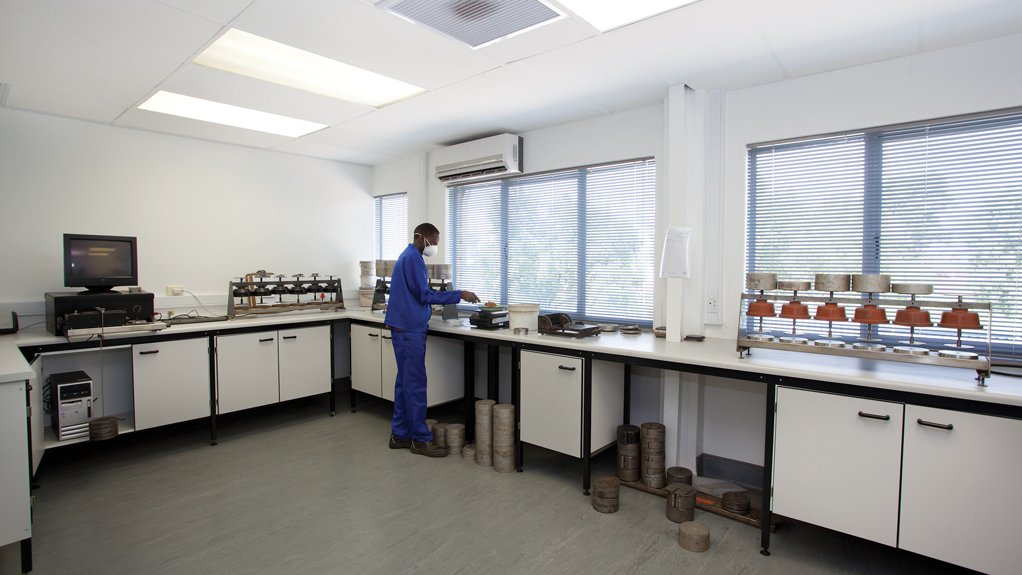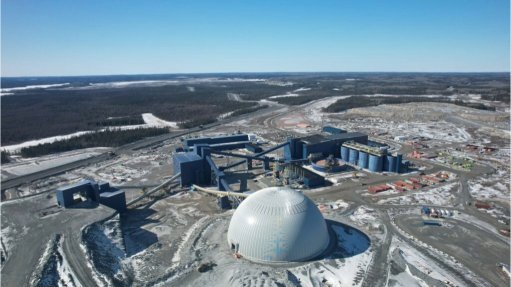Iron ore testwork extends the life-of-mine


LIFE EXTENSION Metallurgical testwork is important when it comes to extending the life-of-mine and to determine suitable processing routes
Metallurgical testwork is not only relevant and necessary to enhance processing and materials handling, but is also important in extending the life-of-mine, reports technology solutions provider Tenova Mining & Minerals South Africa’s metallurgical laboratory.
This aspect of metallurgical testwork is highlighted in the laboratory’s current contract for an iron-ore producer, says Tenova Mining & Minerals South Africa laboratory manager Desiree Gopal, indicating that the contract calls for dense media separation (DMS) testwork on several drill core and pilot plant samples supplied by the mine, which is nearing the end of its anticipated life.
“Information provided is used for characterisation purposes and input for the producer’s pilot plant project, in which they are looking to determine the most suitable processing route for enhancing recovery and upgrading of the remaining ore in their dwindling resources,” she says.
While the industry has seen the value of metallurgical testwork, particularly in the development of new capital projects, the challenging economic environment is further highlighting the role metallurgical laboratories, such as Tenova Mining & Minerals South Africa’s laboratory, play in enhancing production and ensuring that mines get the most out of their investment, Gopal stresses.
“Further, ore types are changing, even on existing mines, as easily accessible resources are exhausted and mines look to exploit harder-to-access deposits. As a result, the initially developed processing route may no longer be ideal for the new mineralogies encountered,” she explains.
For iron-ore deposits, Tenova Mining & Minerals South Africa’s laboratory offers a full range of metallurgical testwork, starting at the comminution phase with crushing utilising jaw, roll and cone crushers, to produce a suitably sized representative sample on which to carry out physical separation tests through DMS testwork or a shaking table. This is followed by X-ray fluorescence analysis to identify the grade of the ore and, if necessary, analysis using an atomic absorption spectrometer for more accurate results.
Testwork Areas
Material flow testwork is another crucial area, as it is important to know material properties and to define flow behaviour, before designing a materials handling plant for a mine, Gopal notes.
“Not only do different commodities have different material properties, the same commodity ores, from different deposits, may display markedly different properties,” she says, stressing that this information is a vital input in deciding what equipment to use, or how certain components should be designed to ensure consistent flow of the material.
The Tenova Mining & Minerals South Africa laboratory has formed an exclusive relationship with Greentechnical, represented by director Stephan Roos, to provide this expertise to clients, and to investigate new ideas and possible developments for material flow testwork.
Gopal notes that testwork has proven that flow behaviour of iron-ores, across Africa, differs with respect to densities and the amount of clay mixtures combined with competent rock. “Usually openpit mines have large quantities of clay deposits.”
“Nevertheless, blends can be created in the laboratory with competent material and clay percentages to represent the ratio of competent truckloads to clay-containing truck loads, typically dumping material through a gyratory crusher. This overall ratio is important and will have an effect on material flowability through the plant. Establishing the point where high clay streams become problematic is identified by the testwork.”
Material flow tests conducted include instantaneous, time-related, density and compressibility, wall friction for liners, as well as chute friction angle tests for a variety of liners. The obtained raw data results are converted into bulk solids flow graphs and design parameters, which are used for design.
African Potential
While most of the laboratory and Greentechnical’s joint workload is currently for the local market, Gopal believes in a greater potential for new plant developments in Africa, such as in the Democratic Republic of Congo, Ghana, Botswana and Mozambique.
“The resources mined in these countries have proven to have different flow characteristics compared with those in South Africa, where materials do not contain such high clay contents but are very abrasive, as opposed to northern Africa, where some materials are much stickier and difficult to handle, owing to wet conditions, which is an immediate flag, necessitating testwork.”
Africa is endowed with most of the world’s richest minerals, but currently, there is a lack of investment for the development of new plants, says Roos. However, whether there are no new developments, or the attention of the mines is focused on maintenance, there is always a demand for reliable materials handling test work, he highlights.
“The cost of a critical transfer chute blocking outweighs the capital cost of a chute due to production losses. The only way to ensure correct design of functional materials handling systems is to have an understanding of the materials behaviour upfront and then, to design systems correctly,” Roos concludes.
Comments
Press Office
Announcements
What's On
Subscribe to improve your user experience...
Option 1 (equivalent of R125 a month):
Receive a weekly copy of Creamer Media's Engineering News & Mining Weekly magazine
(print copy for those in South Africa and e-magazine for those outside of South Africa)
Receive daily email newsletters
Access to full search results
Access archive of magazine back copies
Access to Projects in Progress
Access to ONE Research Report of your choice in PDF format
Option 2 (equivalent of R375 a month):
All benefits from Option 1
PLUS
Access to Creamer Media's Research Channel Africa for ALL Research Reports, in PDF format, on various industrial and mining sectors
including Electricity; Water; Energy Transition; Hydrogen; Roads, Rail and Ports; Coal; Gold; Platinum; Battery Metals; etc.
Already a subscriber?
Forgotten your password?
Receive weekly copy of Creamer Media's Engineering News & Mining Weekly magazine (print copy for those in South Africa and e-magazine for those outside of South Africa)
➕
Recieve daily email newsletters
➕
Access to full search results
➕
Access archive of magazine back copies
➕
Access to Projects in Progress
➕
Access to ONE Research Report of your choice in PDF format
RESEARCH CHANNEL AFRICA
R4500 (equivalent of R375 a month)
SUBSCRIBEAll benefits from Option 1
➕
Access to Creamer Media's Research Channel Africa for ALL Research Reports on various industrial and mining sectors, in PDF format, including on:
Electricity
➕
Water
➕
Energy Transition
➕
Hydrogen
➕
Roads, Rail and Ports
➕
Coal
➕
Gold
➕
Platinum
➕
Battery Metals
➕
etc.
Receive all benefits from Option 1 or Option 2 delivered to numerous people at your company
➕
Multiple User names and Passwords for simultaneous log-ins
➕
Intranet integration access to all in your organisation



















